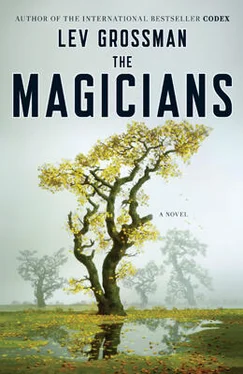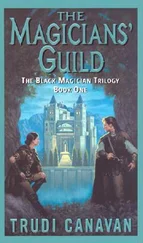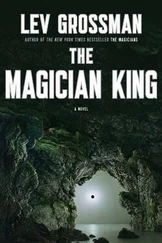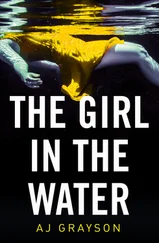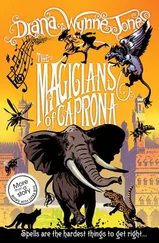It was an easy hike, a beginner’s hike. There was singing. Eliot pointed out a ridge that he said was “positively screaming” to have pinot grapes planted on it. At no point did they see a town or another traveler. The rare tree or fence post they passed cast a crisp shadow on the ground, straight and clear, like it was etched there. It made Quentin wonder how Fillory really worked. There was hardly any central government, so what would a king actually do? The entire political economy appeared to be frozen in the feudal Middle Ages, but there were elements of Victorian-level technology as well. Who had made that beautiful Victorian carriage? What craftsmen wove the innards of the clockwork mechanisms that were so ubiquitous in Fillory? Or were those things done by magic? Either way, they must keep Fillory in its pre-industrial, agrarian state on purpose, by choice. Like the Amish.
At noon they witnessed one of Fillory’s famous daily eclipses, and they observed something that was described in none of the books: instead of being a sphere, the moon of Fillory was formed in the shape of an actual, literal crescent, an elegant silvery arc that sailed through the sky, rotating slowly around its empty center of gravity.
They made camp at sunset in a ragged square scrap of meadow. Ember’s Tomb, Dint told them, was in the next valley over, and they wouldn’t want to spend the night any closer to it. He and Fen divided the watches between them; Penny volunteered to take one, but they declined. They ate some roast-beef sandwiches they’d been saving since the house upstate and unrolled sleeping bags and slept in the open, their bodies pressing flat the tough, coarse green grass underneath.
The hill was smooth and green. Set into its base was a simple post-and-lintel doorway: two enormous rough stone slabs standing upright with a third slab laid across them. In the space between them was darkness. It reminded Quentin of a subway entrance.
It was just dawn, and the door was on the western face of the hill, so the hill’s shadow fell over them. The grass was frosted with pale dew. There was no sound at all. The shape of the hill was a pure emerald-green sine wave against the lightening sky. Whatever was going to happen was going to happen here.
They stopped and huddled a hundred yards away, miserable and unshowered, to pull themselves together. The morning was chilly. Quentin rubbed his hands together and tried a warmth spell that only left him feeling feverish and slightly queasy. He couldn’t seem to get oriented to Fillory’s Circumstances. He had slept heavily the night before, with vivid dreams, the weight of his fatigue sinking him down into dark, primal realms haunted by roaring winds and tiny furry beasts, early mammals hiding fearfully in the long grass. He wished he could just stand here a little longer and look at the pink light on the dew. Everybody had a heavy hunting knife, which back on Earth had seemed beyond overkill but now felt pathetically inadequate.
The shape of the hill tugged at something in his deep memory. He thought of the hill they’d seen in that enchanted mirror, in that musty little storeroom back at Brakebills, where he and Alice and Penny had studied together, so long ago. It looked like the same hill. But so did a thousand hills. It was just a hill.
“So just to be clear,” Eliot was saying to Dint and Fen. “It’s called Ember’s Tomb, but Ember isn’t buried here. And he’s not dead.”
He sounded exactly as relaxed and unworried as he ever had back at Brakebills. Just dotting the i ’s, clearing up the details, the way he would have insouciantly picked apart one of Bigby’s problem sets, or decoded a closely written wine label. He was in control. The deeper they rolled into Fillory, the shakier Quentin felt, but Eliot was the opposite: he just got calmer and more sure of himself, exactly the way Quentin had thought that he, Quentin, would, and exactly the way that he wasn’t.
“Every age finds a use for this place,” Fen was saying. “A mine, a fortress, a treasure house, a prison, a tomb. Some dug it deeper. Others walled up the parts they didn’t need or wished to forget. It is one of the Deep Ruins.”
“So you’ve been here before?” Anaïs asked. “I mean, in there?”
Fen shook her head. “Not this one. A hundred places like it.”
“Except that the crown is in this one. And how did it get there exactly?”
Quentin had wondered that same thing. If the crown really had belonged to Martin, maybe that was where he went when he disappeared. Maybe he died down there.
“The crown is there,” Dint snapped. “We will go in and get it. Enough questions.”
He swirled his cape impatiently.
Alice was standing very near Quentin. She looked small and still and cold.
“Quentin, I don’t want to go in there,” she said softly, without looking at him.
Over the past week Quentin had devoted literally hours to fantasizing about what he would say to Alice if she ever spoke to him again. But all his carefully planned speeches fell away at the sound of her voice. She wasn’t going to get a speech. It was so much easier to be angry. Being angry made him feel strong, even though — and this contradiction did nothing to diminish his anger — he was angry only because his position was so weak.
“So go home,” was all he said.
That wasn’t right either. But it was too late, because somebody was running toward them.
The weird thing was that the entrance to the tomb was still a hundred yards off, and Quentin could see the creatures coming the whole way, two of them, running flat out across the wet grass for at least a minute, like they were out doing early-morning wind sprints. It was almost funny. They weren’t human, and they didn’t seem to belong to the same species as each other either, but they were both cute. One was something like a giant hare, squat and covered in gray-brown fur, maybe four feet tall and about that wide. It hopped toward them determinedly, its long ears flattened back. The other one was more like a ferret — or maybe a meerkat? A weasel? Quentin tried to think what the closest equivalent furry animal would be. Whatever it was it ran upright and it was tall, seven feet at least, most of it long silky torso. Its face was chinless, with prominent front teeth.
This odd couple came charging at them across the green grass silently, no battle cry, no sound track, in the still early-morning air. At first it looked like they might be running to greet them, but Bunny had short, stubby swords in both its front paws, held out steady in front of him as he ran, and Ferret was hefting a quarterstaff.
They closed to within fifty yards. The Brakebills crowd shrank back involuntarily, as if the newcomers exerted an invisible force field. This was it: they had come to the end of what was conceivable. Something was about to give. It had to. Dint and Fen didn’t move. Quentin realized there wasn’t going to be any parley or rock-paper-scissors. This was going to be about stabbing. He had thought he was ready, but he wasn’t. Somebody had to stop it. The girls were hanging on to each other as if in a howling wind, even Alice and Janet.
Oh my God, Quentin thought, this is really happening. This is really happening.
Ferret arrived first. It stutter-stepped to a jittery stop, breathing hard. Its huge eyes blinked as it smoothly spun its staff two-handed in a figure-eight pattern. It whickered in the still air.
“Hup!” yelled Fen.
“Ha!” Dint answered.
They set themselves side by side, as if they were getting ready to lift something heavy. Then Dint stepped back, ceding first blood.
“Jesus,” Quentin heard himself say. “Jesus jesus jesus.” He wasn’t ready for this. This wasn’t magic. This was the opposite of magic. The world was ripping open.
Читать дальше
